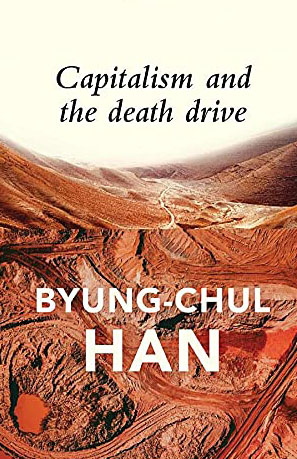Occasionally interesting insights, lost, adrift in seas of postmodern academic claptrap.


Hmm? Pretty poor, in my opinion. I recently read and reviewed the much, much better critique of Capitalism, Post Growth, by Tim Jackson. Both books are published by Polity, who specialise in this sort of stuff.
First of all this is a collection of short essays, most (but not all) of which have been published elsewhere before. A consequence of this format is lots of repetition. Not great. These essays cover numerous topics, the chief of which is criticism of capitalism/neoliberalism. But other areas talked about include refugees, Europe, Covid and the arts. The first two thirds are short essays, the last part interviews.
Han is a South Korean living/working in Germany (so it’s all translated from German), as a philosopher and lecturer in an arts university. This embedding in such an institution is crucial, as it informs his language and points of reference, both of which are mired in the tediously opaque traditions of postmodernism. These are more or less unchanged from when I studied art/art history at Goldsmiths, with frequent use of buzz-words such as affect, and haptic, and references to Barthes, Adorno, Baudrilard, etc.

At certain points, in essays about contemporary arts culture, he discusses pornography vs eroticism, and rhapsodises about the latter, as being far better (capitalism favouring the ‘in your face’ m.o. of porn). And in these passages you get a glimpse of the crux of the postmodern problem (or rather one of many such problems), namely that obscuring is preferred to ‘unveiling’. Put another way, florid verbiage trumps understanding!
There are many valid insights, scattered throughout the text. But there are just as many vapid unfounded (or rather unsubstantiated) remarks. And the dominant register is negativity. Endless critique – neoliberalist capitalism isolates us all, and makes us internalise blame, and burn-out in hyper performance (he’s also written a book called The Burn-Out Society) – which might be true; but with no real suggestions of better ways out of such contemporary impasses, eventually it comes over as carping.
In the landmark ‘sledgehammer’ series Civilisation, stuffily patrician art historian Kenneth Clarke remarked, in his inimitable and oft very prescient manner, that the German language lacked a clear workable prose, such as English has developed, much to the ‘troubling’ of Europe. If one understands what Clarke was getting at, this book is – to my mind – a prime example, albeit from the left, as opposed to the right. And, ironically, by being so windily obscure, it plays into the hands of neoliberalist capitalism, effectively neutering itself. And, to use one of the buzz-words Han overuses, is all affect, to no effect.*
I find books on the topics this covers of interest. But I can’t say I either enjoyed or would recommend this one. It belongs, frankly speaking, to a tradition – the postmodern – that I hope will wither on the vine sooner rather than later.
*I also find it annoying when books of this ilk bandy round buzzwords with no attempt to define them. That’s the case with ‘affect’ here, amongst others. The sense of the word in postmodern-speak strikes me as closer to the meaning of the word ‘affectation’ than the normal dictionary definition of affect, as a verb, the doing of which produces the equivalent noun, or effect.

Without actually reading the essays and books, I can’t add anything useful except to ask: why do you think these worth sharing? 🙂
pete
My emotional reaction to that is, that’s a bit harsh. But my intellectual reaction is, I can see a point you’re making, which I’ll come back to.
I frequently read reviews by other readers before reading a book myself. I was a paid reviewer of all sorts for Drummer magazine for over a decade (now defunct, sadly), and I’ve been a ‘paid in kind’ reviewer for Amazon, Pen & Sword (military publishers) and a few other random publishers here and there for many years now. So it’s become a part of my life. I also find reviewing stuff, like writing an essay at school/college, whatever, helps one internalise more of the contents.
Partly my reviews are intended to be helpful for prospective readers, obviously. And I do get occasional feedback that suggests that is, sometimes, the case. But they’re also a way to interact with other people who have read the stuff I’ve reviewed, so we can compare notes/opinions.
I found the reaction, even just to my saying I was thinking of reading Jordan Peterson’s 12 Rules very interesting. Since posting those remarks and the reviews, I’ve also come across JP having a long online chat with Stephen Fry, about stuff that has a bearing on all the hoo-ha about him being a reactionary conservative. So it’s really all just part of attempting to have conversations, online or otherwise, with the world at large. Rather like FB, perhaps?
But I take one of your potential points, which is that in some of these reviews – the one of 12 Rules, much longer more detailed, is different in this respect – I’m not synopsising what the author is saying. My blog is intended as the place where I can take more time over these things (and I’m still editing/finishing the Death Drive piece). Whereas the Amazon reviews – and you might well already know how short (and info free, re the subjects) the average reviews there are – are usually shorter.